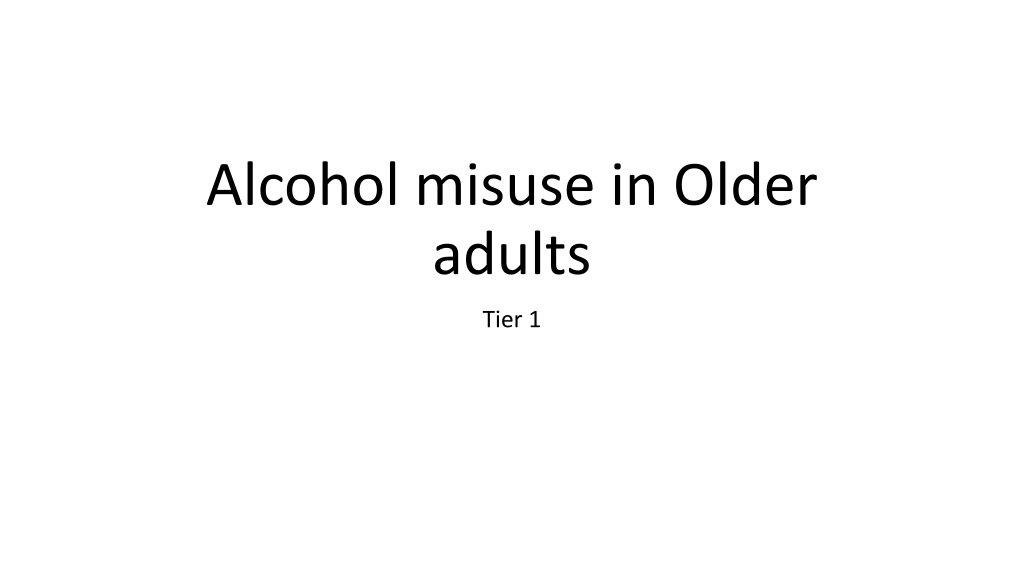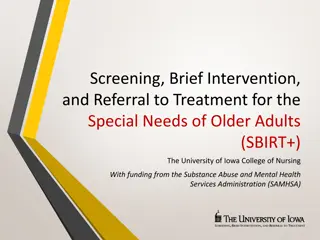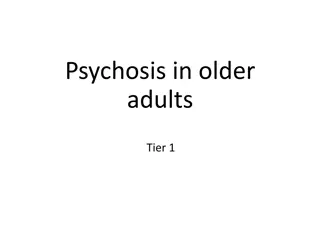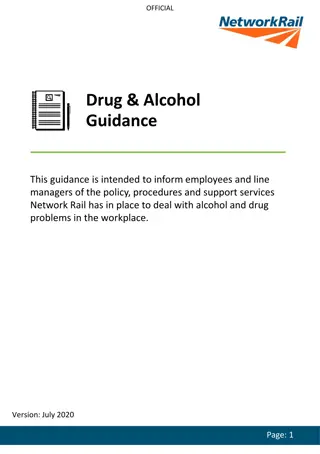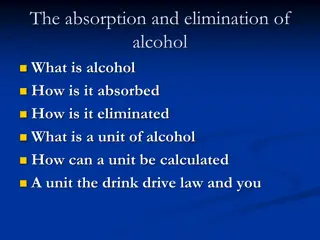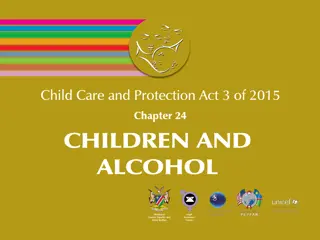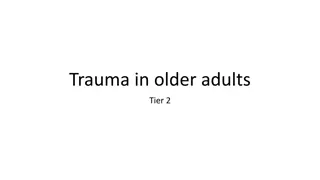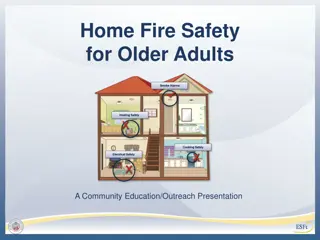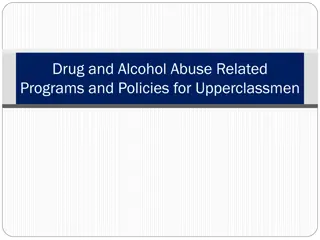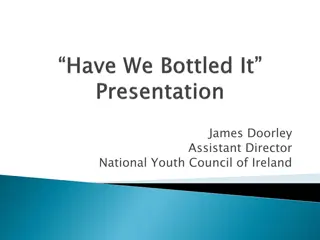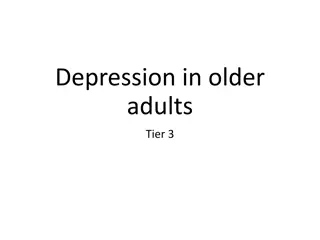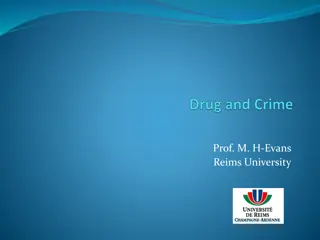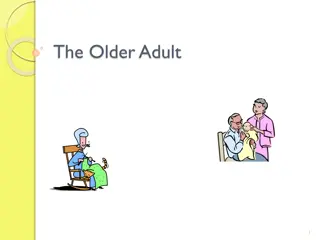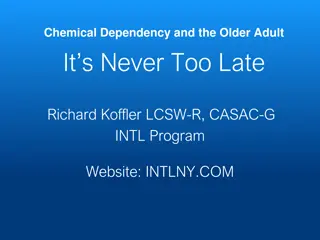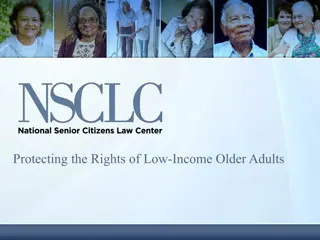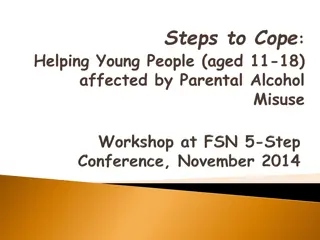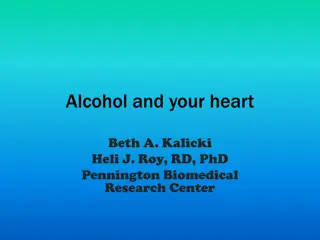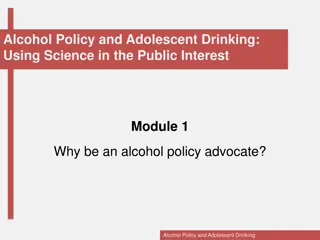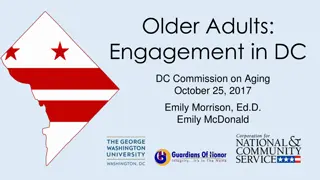Understanding Alcohol Misuse in Older Adults
Alcohol misuse in older adults can have serious health consequences, with harmful drinking patterns and alcohol dependence on the rise among this demographic. Aging bodies process alcohol differently, making older adults more vulnerable to its effects, including physical and mental health issues. Alcohol can exacerbate existing health problems, interact with medications, and lead to conditions such as ulcers, liver damage, and mental health disorders. Education and awareness are crucial to address this growing concern.
Download Presentation

Please find below an Image/Link to download the presentation.
The content on the website is provided AS IS for your information and personal use only. It may not be sold, licensed, or shared on other websites without obtaining consent from the author. Download presentation by click this link. If you encounter any issues during the download, it is possible that the publisher has removed the file from their server.
E N D
Presentation Transcript
Alcohol misuse in Older adults Tier 1
What is normal? Weekly limits can be misleading. If just a quarter of the recommended weekly amount is drunk over a matter of hours, this is more likely to be harmful.
Harmful drinking and alcohol dependence Harmful drinking is defined as a pattern of alcohol consumption causing health problems directly related to alcohol. Alcohol dependence is characterised by craving, tolerance, a preoccupation with alcohol, and continued drinking in spite of harmful consequences Older adults tend to drink less alcohol than younger adults However, 1 in 5 older men and 1 in 10 older women drink enough to harm themselves These figures have increased by 40 percent in men and 100 percent in women over the past 20 years
Effects of ageing As people get older, their bodies change. Older adults: lose muscle gain fat break down alcohol more slowly Older adults become more sensitive to the effects of alcohol Even if older adults drink the same amount of alcohol as when they were younger it is likely to affect them adversely
Impact of alcohol on older adults Health problems can make an older adults more susceptible to the side effects of alcohol Alcohol can damage nearly every part of the body Alcohol can also : add to the effect of some medications, e.g. painkillers or sleeping tablets. reduce the effect of others, e.g. medication to thin the blood (warfarin)
Alcohol can impact on their Physical health Older adults who drink alcohol can experience Stomach ulcers and bleeding Liver damage, Heart problems, Cancers of mouth, stomach and liver, Malnutrition Falls and accidents as they can have problems with their balance Blackouts and fits Brain bleeds after a minor fall and injury Impaired sleep Increased attendances to acute hospitals
Alcohol can impact on their Mental health Older adults who drink alcohol can experience: Anxiety Depression Hearing voices and seeing things especially if they are experiencing withdrawal symptoms Confusion Dementia Concurrent misuse of illegal drugs/ benzodiazepines
What are some of the triggers for older adults to drink too much ? Possible triggers: Bereavement Difficulty getting around and social isolation can lead to boredom and depression Physical illnesses including pain. Some people might use alcohol to make these difficulties more bearable Self-medication using alcohol to manage untreated mental illness such as anxiety. About a third of older adults with drinking problems (mainly women) develop them for the first time in later life.
What signs might suggest the person is drinking too much? Empty bottles of alcohol in the flat If you find the person is drinking in the morning or after they wake up Excessive sweating or shaking Other people being concerned about the amount the person is drinking Physical and mental health problems as listed in the previous slides
What should you do? If you think that the person has an alcohol problem, encourage them to talk to their GP. If necessary, their GP can: Arrange the most appropriate blood tests Refer to NHS alcohol team Refer to a mental health team Refer for talking therapy
Resources Addaction Supports individuals and families with the ultimate aim of abstinence. Email: info@addaction.org.uk. Alcoholics Anonymous National helpline: 0845 769 7555 MPC_05_03 Alcohol and Other Addictive Drugs | MPC_05_03 Alcohol and Other Addictive Drugs (mindedforfamilies.org.uk) This is an easy to access website for older adults and their families which has good advice about symptoms and strategies to reduce alcohol and substance misuse in older adults
